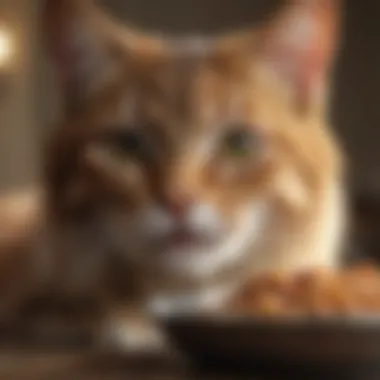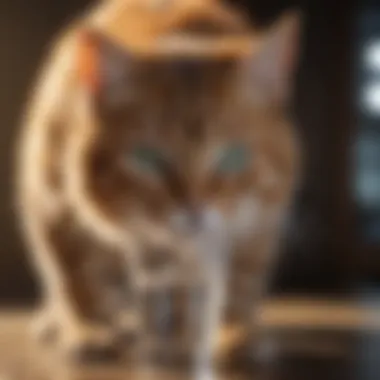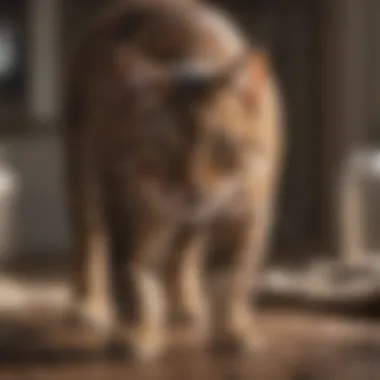Unraveling the Complex Causes of Constipation in Cats


Pet Care Essentials
Constipation in cats is a prevalent health issue that pet owners need awareness about. Understanding the intricate causes behind this condition is crucial in safeguarding the digestive health of feline companions. Cats, known for their selective eating habits, may encounter constipation due to various factors, including diet, hydration levels, and underlying health conditions. Daily Nutrition Requirements play a significant role in preventing constipation. Ensuring that your cat's diet is rich in fiber can promote healthy digestion. Additionally, maintaining adequate hydration levels is crucial for preventing constipation in cats. Exercise and Playtime are also vital aspects to consider when addressing constipation in felines. Physical activity aids in maintaining a healthy digestive system and can help prevent constipation. Grooming Tips are essential in preventing hairballs that may contribute to constipation. Health and Wellness Check-ins are necessary to monitor any early signs of constipation or underlying health issues that could lead to this condition in cats.
Introduction to Constipation in Cats
Constipation in cats is a prevalent concern among pet owners, impacting the overall well-being and digestive health of feline companions. Understanding the causes behind feline constipation is crucial for taking proactive measures to prevent and manage this condition effectively. In this comprehensive guide, we will delve into the intricate reasons that contribute to constipation in cats, shedding light on various factors ranging from dietary influences to medical and environmental triggers. By exploring these aspects, pet owners can equip themselves with the knowledge needed to ensure their cats' digestive health and overall quality of life.
Overview of Constipation
Definition of constipation in cats
When we talk about constipation in cats, we refer to the difficulty or infrequency of bowel movements. This condition manifests as the inability to pass stools regularly, leading to discomfort and potential health complications. Understanding the specific criteria that define constipation in cats, such as hard or dry stools and straining during elimination, is essential for recognizing and addressing this issue promptly. By identifying these key characteristics, pet owners can intervene early and prevent the progression of constipation into a more severe concern.
Frequency and impact on feline health
The frequency of constipation episodes in cats varies based on individual factors like age, diet, and lifestyle. Chronic constipation can have a significant impact on a cat's overall health, triggering symptoms like lethargy, loss of appetite, and even complications like megacolon. By exploring the prevalence of constipation in felines and its repercussions on their well-being, we gain insight into the importance of proactive management and preventive measures. Through a deeper understanding of how constipation affects feline health, pet owners can tailor interventions to support their cat's digestive comfort and long-term vitality.
Dietary Factors Influencing Constipation
In this section, we delve into the crucial role that dietary factors play in influencing constipation in cats. The diet of a cat has a profound impact on its digestive health, and understanding how different food components affect bowel movements is essential for preventing and managing constipation. By focusing on dietary factors, we can address key elements such as water intake, fiber content, and the importance of a balanced diet tailored to a cat's specific needs.
Inadequate Water Intake
Impact of dehydration on digestion
Dehydration can significantly impair a cat's digestive system, leading to issues like constipation. When a cat doesn't consume enough water, its stools can become hard and difficult to pass, resulting in constipation. Lack of hydration slows down the transit of food through the intestines, making it harder for the cat to eliminate waste effectively. Encouraging proper hydration is crucial to maintain healthy digestion and prevent constipation in cats.
Encouraging hydration in cats
Encouraging cats to drink an adequate amount of water is vital for their overall well-being. Providing fresh water in clean bowls, using water fountains to entice drinking, and incorporating wet food into their diet are effective ways to increase hydration. By promoting hydration, cat owners can support healthy digestion and reduce the risk of constipation-related issues.


Low-Fiber Diet
Incorporating an optimal amount of fiber in a cat's diet is essential for gastrointestinal motility and preventing constipation. Fiber adds bulk to the stool, making it easier for the cat to pass waste smoothly. However, it's important to strike a balance when introducing fiber into a cat's diet to prevent potential digestive disturbances.
Role of fiber in gastrointestinal motility
Fiber plays a crucial role in promoting regular bowel movements by aiding in the passage of waste through the digestive system. It improves stool consistency and helps regulate bowel habits, reducing the likelihood of constipation. By understanding the importance of fiber, cat owners can make informed choices when selecting cat food that supports healthy digestion.
Balancing fiber intake in cat food
While fiber is beneficial for feline digestive health, excessive amounts can lead to gastrointestinal issues. It's essential to carefully manage the fiber content in a cat's diet to prevent both constipation and diarrhea. Finding the right balance of fiber intake through high-quality cat food ensures that cats receive the necessary nutrients for optimal digestion without compromising their gastrointestinal well-being.
Lack of Exercise
Physical activity plays a significant role in maintaining a cat's digestive health and preventing constipation. Regular exercise promotes proper gastrointestinal motility and aids in regulating bowel function. Encouraging cats to stay active through play and movement is integral to supporting their overall well-being.
Importance of physical activity for digestive health
Engaging in physical activity stimulates intestinal contractions, which helps move food through the digestive tract efficiently. Cats that are sedentary are more prone to constipation due to sluggish bowel movements. Incorporating exercise into a cat's routine promotes robust digestion and reduces the risk of gastrointestinal issues.
Promoting play and movement for cats
Creating opportunities for cats to play and be active is essential for preventing constipation. Interactive toys, climbing structures, and engaging play sessions not only provide physical stimulation but also mental enrichment for cats. By encouraging play and movement, cat owners can contribute to their feline companion's digestive health and overall quality of life.
Medical Causes of Constipation
In this pivotal section on Medical Causes of Constipation in Cats, we delve deeply into the intricate web of factors that can lead to this distressing health issue in our feline companions. The specific elements we focus on here are essential to understand to ensure the well-being of our beloved pets. By shedding light on these medical causes, we equip cat owners with the knowledge needed to mitigate the risks and address constipation effectively.
Feline Megacolon
Symptoms and implications of feline megacolon
Steering our attention towards the daunting issue of Symptoms and implications of feline megacolon, we unravel the cryptic signs that indicate a larger problem in our cats' digestive tract. Understanding the key characteristics of feline megacolon symptoms is crucial in diagnosing and intervening early to prevent complications. This detailed exploration sheds light on why recognizing these signs is paramount in the holistic management of feline constipation, offering a deeper insight into the challenges faced by our furry friends.


Treatment options and management strategies
Turning to the realm of Treatment options and management strategies for feline megacolon, we dissect the treatment modalities available for this serious condition. Highlighting the efficacy of various management approaches is essential to tailor interventions for individual cats effectively. By outlining the unique features of different treatment options, we provide a comprehensive overview of the advantages and potential drawbacks in addressing feline megacolon, offering a nuanced perspective for cat owners.
Obstructions in the Digestive Tract
Types of obstructions affecting cats
Delving deeper into the hindrances caused by Types of obstructions affecting cats, we unravel the complexities of digestive blockages that can lead to severe constipation. Recognizing the key characteristic signs of these obstructions is crucial in diagnosing and treating cats promptly. By understanding the unique features of different obstructions, we shed light on the challenges faced in mitigating these risks and potentially life-threatening conditions, offering crucial insights for cat owners.
Surgical interventions for digestive blockages
Exploring the realm of Surgical interventions for digestive blockages, we investigate the crucial role of surgical procedures in addressing severe obstructions in cats. Highlighting how these interventions can be life-saving in critical situations is essential for cat owners to comprehend the potential benefits and risks involved. By detailing the unique features of surgical options, we provide a comprehensive view of the advantages and considerations in opting for surgical management of digestive blockages, empowering pet owners with valuable information.
Neurological Disorders
Impact of neurological conditions on bowel function
Shifting our focus to the intricate territory of the Impact of neurological conditions on bowel function in cats, we elucidate how neurological issues can disrupt normal bowel movements and lead to constipation. Understanding the key characteristics of these conditions is paramount in crafting strategies to manage constipation effectively. By exploring the unique quirks of neurological impacts on bowel function, we offer a nuanced perspective on the challenges faced in addressing constipation related to nerve issues, providing valuable insights for caring cat owners.
Managing constipation related to nerve issues
In this section, we delve into the nuances of Managing constipation related to nerve issues, exploring the interventions and strategies that can help alleviate constipation stemming from neurological problems. Highlighting the key characteristics of management approaches tailored to nerve-related constipation is essential in ensuring the well-being of affected cats. By discussing the unique features of these management techniques, we offer a comprehensive view of the advantages and potential limitations in addressing constipation related to nerve issues, equipping pet owners with the knowledge needed to support their feline companions.
Environmental Factors Contributing to Constipation
Constipation in cats is a common health issue that can be influenced by various environmental factors. In this section, we will delve into the significance of these factors and their impact on feline health. Environmental factors play a crucial role in the digestive well-being of cats, affecting their overall comfort and happiness. Understanding how elements in their environment contribute to constipation can help pet owners create a more conducive living space for their beloved feline companions.
Litter Box Issues
Ensuring a clean and suitable litter box environment is essential for preventing constipation in cats. The effect of unclean or inappropriate litter boxes can lead to stress and discomfort for cats, hindering their natural elimination processes. Pet owners must pay attention to the design and cleanliness of the litter box to promote healthy bowel movements in their pets.
Creating a Cat-Friendly Elimination Environment


A cat-friendly elimination environment focuses on providing cats with a space that mimics their natural instincts. By creating a designated and peaceful area for elimination, pet owners can reduce stress and anxiety in their feline friends. This approach encourages regular and comfortable bowel movements, contributing to overall digestive health.
Stress and Anxiety
Stress and anxiety can have a significant impact on a cat's bowel movements, potentially leading to constipation. Understanding the psychological effects of stress on feline health is crucial for recognizing early signs of discomfort. Implementing effective strategies to reduce stress can help maintain normal bowel functions in cats, ensuring their well-being.
Psychological Impact on Feline Bowel Movements
Psychological stressors can disrupt a cat's digestive system, resulting in irregular bowel movements and constipation. Recognizing the signs of stress-related constipation is vital for intervening promptly and providing appropriate care. Addressing the psychological aspects influencing a cat's bowel health is imperative for preventing constipation and promoting overall well-being.
Strategies to Reduce Stress in Cats
To alleviate stress in cats, pet owners can employ various strategies focusing on creating a calm and harmonious environment. Engaging in interactive play, offering comfort, and establishing routines can significantly reduce stress levels in felines. By implementing these strategies, pet owners can support healthy digestion and prevent constipation in their beloved cats.
Changes in Routine
Changes in a cat's routine can impact their digestion and contribute to constipation. Establishing a consistent daily schedule plays a vital role in regulating bowel movements and promoting gastrointestinal health in cats. Pet owners must understand the significance of routine stability for their cat's digestive well-being.
Impact of Disrupted Schedules on Cat's Digestion
Disrupted schedules can disrupt a cat's natural rhythm, leading to irregular bowel movements and constipation. Recognizing how changes in routine affect a cat's digestion is essential for maintaining optimal gut health. By acknowledging the impact of disruptions, pet owners can take steps to minimize digestive issues and support regular elimination.
Establishing Consistent Daily Routines
Establishing a consistent routine provides cats with predictability and stability, key elements for overall well-being. Consistent meal times, play sessions, and rest periods contribute to a cat's physical and emotional health. By adhering to a set daily schedule, pet owners can foster good digestion habits and help prevent constipation in their feline companions.
Preventive Measures and Treatment Options
In the realm of feline health, preventive measures and treatment options play a pivotal role in ensuring the well-being of our beloved furry companions. When it comes to addressing constipation in cats, adopting a proactive stance can make a significant difference in promoting digestive health. By focusing on preventive strategies and understanding the treatment avenues available, pet owners can enhance the quality of life for their feline friends. Preventive measures encompass a range of interventions aimed at averting the onset of constipation, while treatment options cater to managing existing cases with efficacy.
Moreover, preventive measures not only serve to alleviate current symptoms but also strive to prevent recurrences, thereby fostering a sustainable approach to feline constipation. By embracing a comprehensive plan that combines preventive measures alongside tailored treatment options, pet owners can embark on a journey towards fostering optimal digestive health in their cats. The consideration of preventive strategies alongside treatment options underscores the holistic approach required to address constipation in cats effectively, nurturing a harmonious balance between proactive care and responsive interventions.
Hydration and Dietary Adjustments
In the realm of feline hydration and dietary adjustments, the quest for optimal digestive health takes center stage. Hydration stands as a cornerstone element in maintaining proper physiological functions, especially when it comes to promoting digestive regularity in cats. Adequate water consumption is vital for ensuring smooth gastrointestinal motility, reducing the risk of constipation, and supporting overall well-being. Cat owners can explore various tips to encourage increased water intake among their feline companions, such as incorporating fountains or placing multiple water bowls in different locations.
When delving into the realm of selecting the right cat food for digestive health, the significance of dietary choices unveils itself prominently. Opting for cat food rich in fiber promotes healthy digestion and aids in preventing constipation. By scrutinizing the ingredients of cat food and opting for formulations tailored to digestive well-being, pet owners can prioritize their cat's gastrointestinal health effectively. Choosing the right cat food not only influences digestive regularity but also contributes to the overall health and vitality of our feline friends, showcasing the interconnected nature of hydration and dietary adjustments in combating constipation.
This intertwining of hydration strategies and dietary adjustments sets the stage for a nuanced exploration of preventive measures and treatment options concerning constipation in cats. By navigating the intricacies of feline hydration needs and dietary considerations, pet owners can empower themselves with the knowledge and tools necessary to champion digestive health in their feline companions, elevating their well-being and quality of life to new heights.







